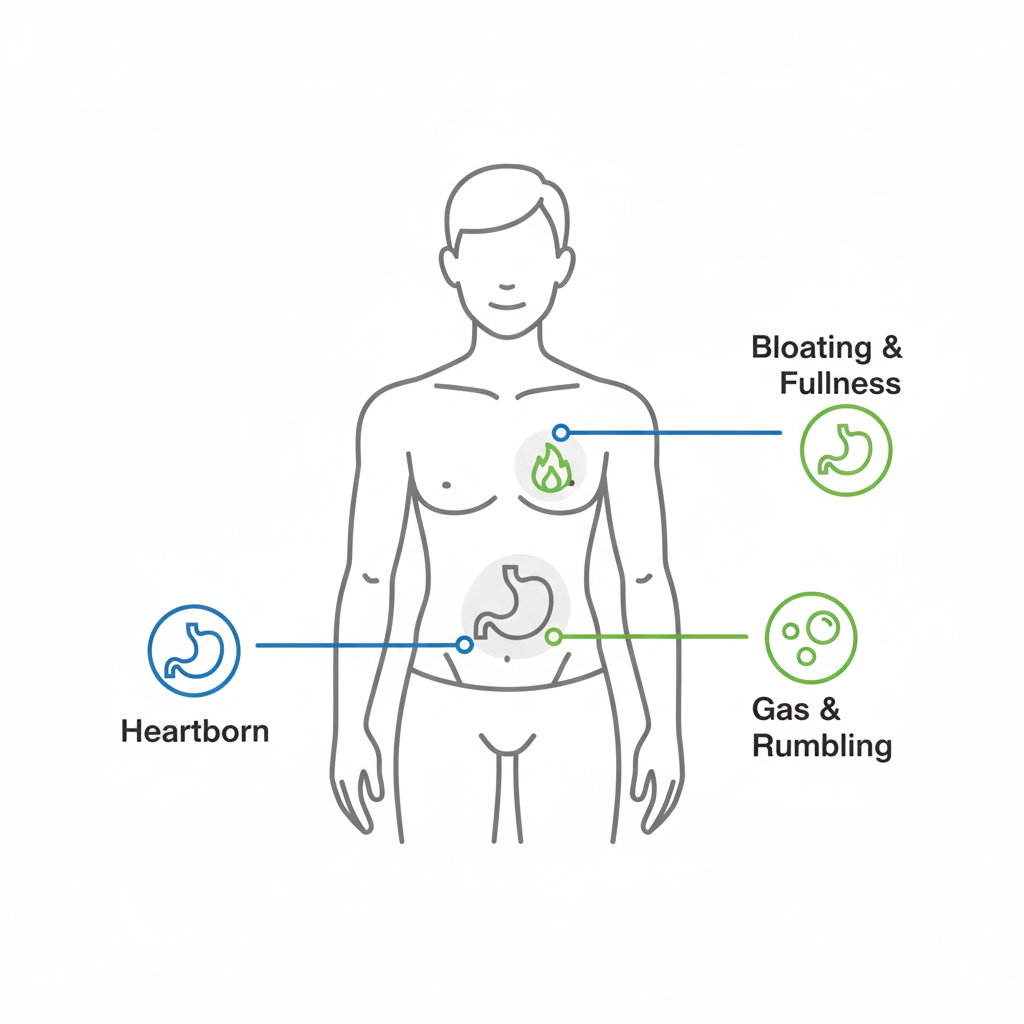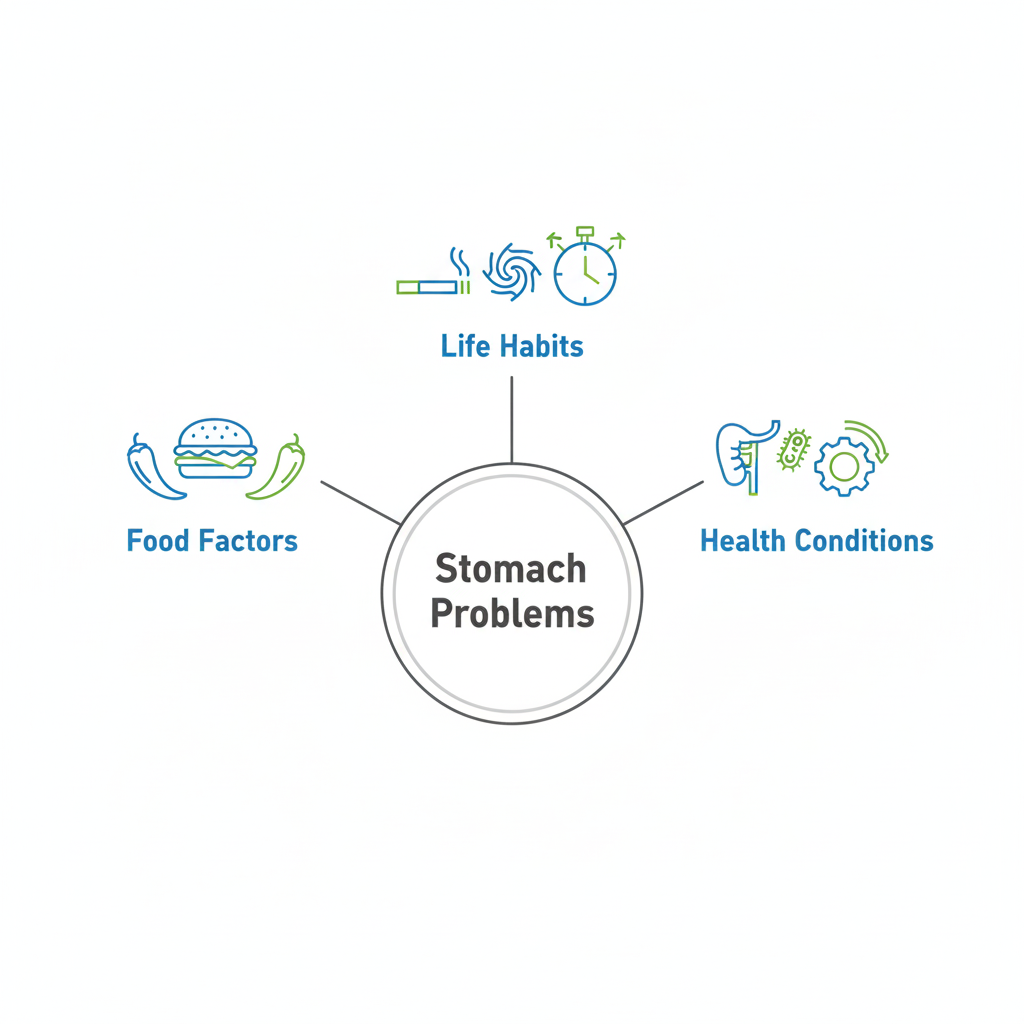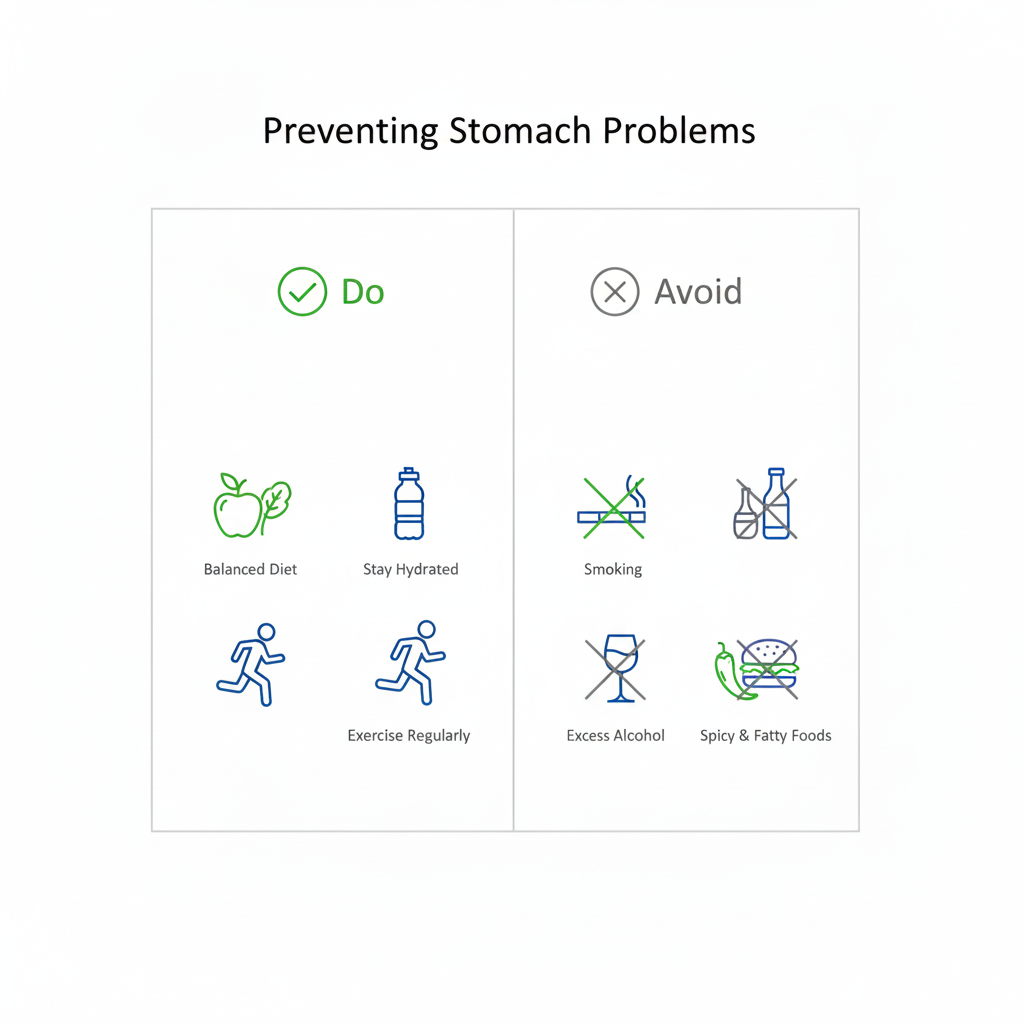Stomach problems affect millions of people around the world. These issues can make you feel bad and change how you live each day. If your stomach often hurts or feels funny, you need to know what might be wrong. You also need to know how to feel better. At DrMorepenHome.com, we want to help you learn about your stomach health. We believe everyone should know how to take care of their digestion.
What Are Stomach Problems?
Simple Definition
Stomach problems are issues with your digestive system. They mostly affect your stomach. These problems can be small, like feeling a bit sick after eating. They can also be big, causing lots of pain. When your stomach doesn't work right, you might feel sick, bloated, or have burning feelings.
Common Types of Stomach Issues
Indigestion: This makes your upper belly feel full or hurt.
Acid Reflux: Stomach acid goes up into your throat. This causes heartburn - a burning feeling in your chest.
Gastritis: Your stomach lining gets red and swollen. This causes pain and makes you feel sick.
Peptic Ulcers: These are sores inside your stomach or small intestine.
Knowing about these types helps you figure out what's wrong with your stomach.
Who Gets Stomach Problems?
Anyone can have stomach problems. But some people have higher chances:
Age: Older people often have more digestive issues.
Food choices: Eating fatty or spicy foods can cause problems.
How you live: Stress and eating at weird times can make stomach problems worse.
Knowing who might get these problems helps doctors prevent and treat them better. You can learn more about staying healthy by reading our blog on preventive healthcare.
Signs of Stomach Problems
Learning the signs of stomach problems helps you get help early. This leads to better health results.

Signs of Indigestion
- Feeling bloated and full quickly
- Feeling too full after eating
- Burning feeling in your stomach between meals or at night
Knowing these signs helps you get medical help fast. This stops bigger problems from happening.
Understanding Bloating and Gas
Bloating and gas come from what you eat and health conditions. Common signs include:
- Your belly feels swollen
- Lots of gas
- Rumbling sounds in your stomach
Changing what you eat and how you live often helps these uncomfortable feelings.
Spotting Heartburn and Acid Reflux
Heartburn is a painful burning in your chest or throat. Acid reflux causes it. Signs include:
- Burning feeling in your chest, usually after eating
- Bitter or sour taste in your mouth
- Hard time swallowing
Understanding and managing these signs can stop worse conditions like GERD. Check out our simple guide on full body checkups for complete health monitoring.
What Causes Stomach Problems
To manage stomach issues well, you need to understand what causes them.

Food Factors That Affect Stomach Health
What you eat plays a big role in digestive health. Some foods and eating habits can cause stomach problems:
Fatty and Spicy Foods: These can irritate your stomach lining. They make your stomach produce more acid.
Alcohol and Caffeine: These might relax your stomach valve. This lets stomach acid escape into your throat.
Eating Too Much: This puts pressure on your stomach. It can lead to acid reflux.
Knowing about these food factors helps you make better food choices. This promotes good stomach health.
Life Habits and Their Effects
Besides food, how you live greatly affects stomach health:
Smoking: Makes more acid and weakens your throat valve.
Stress: Can change digestion and make stomach symptoms worse.
Eating at Odd Times: Connected to indigestion and bloating.
Making positive life changes can greatly reduce the risk of stomach disorders.
%20(1).png)
Health Conditions Linked to Stomach Issues
Several health conditions can cause or make stomach problems worse:
Hiatal Hernia: Causes acid reflux by letting stomach acid move into your throat.
H. pylori Infection: A bacteria linked to ulcers and long-term gastritis.
Gastroparesis: Delayed stomach emptying can cause bloating and feeling sick.
Understanding these conditions and working with doctors can help address the root causes of stomach problems.
Diagnosis and Tests for Stomach Problems
When to See a Doctor for Stomach Issues
Knowing when to get medical help for stomach issues is important for good management. Sometimes feeling bad is normal. But ongoing or severe symptoms need professional help. If you have chronic pain, unexplained weight loss, trouble swallowing, or keep throwing up, you need to consult a healthcare provider. Early diagnosis can prevent problems and start proper treatment quickly.

Common Tests
When you visit a doctor for stomach concerns, they may suggest specific tests. These help find what's causing your symptoms. Common tests include:
Endoscopy: A procedure using a camera to look inside your digestive tract. It finds issues like ulcers or swelling.
Ultrasound and CT Scans: These take detailed pictures of your stomach and nearby organs to find problems.
Blood Tests: These help find infections, check liver function, and look at pancreatic health.
Stool Tests: These can find infections or absorption issues by looking at stool samples for germs or blood.
Understanding Test Results
Reading test results can be hard. So talking about findings with your doctor is important. They will help you understand the results and what they mean for your health. Results may point to common conditions like acid reflux or gastritis. They might also show more serious issues like H. pylori infection, which needs specific treatment. Working with your healthcare provider ensures a complete plan made just for your specific needs.
Treatment and Management of Stomach Issues
Food Changes for Relief
Changing your diet can greatly help manage stomach problems. Consider these food adjustments:
Avoid Triggers: Find and eliminate foods that make your symptoms worse. Common problems include spicy foods, caffeine, alcohol, and fatty foods.
Smaller, More Frequent Meals: Eating smaller meals throughout the day can reduce stomach pressure and prevent acid reflux.
High-Fiber Diet: Add fruits, vegetables, and whole grains to improve digestion and prevent constipation.
A personalized eating plan can help manage symptoms well and improve overall digestive health.
Medicines and Remedies for Stomach Problems
Medicines can provide relief and treat underlying causes of stomach issues. Common medicines include:
Antacids: Help neutralize stomach acid, giving quick relief from heartburn and indigestion.
Proton Pump Inhibitors (PPIs): Reduce stomach acid production and help heal the throat.
H2 Receptor Blockers: Decrease stomach acid production over a long period.
Over-the-counter remedies can help mild cases. But ongoing symptoms may need prescription medicine under a doctor's guidance.
Long-term Management Plans
Besides diet and medicine, adopting lifestyle changes can manage stomach problems long-term. Consider using these strategies:
Stress Management: Techniques like yoga, meditation, and regular exercise can reduce stress - a known cause of stomach issues.
Sleep Habits: Make sure you get enough rest in a comfortable position. This can affect stomach acid reflux and digestion.
Regular Follow-ups: Schedule routine check-ups with your healthcare provider to monitor your condition and adjust treatment plans as needed.
By combining these approaches, you can create an effective plan made for maintaining and improving digestive health.
Preventing Stomach Problems
Healthy Eating Habits
Preventing stomach problems starts with adopting healthy eating habits. Here are practical tips to maintain stomach health:
Balanced Diet: A diet rich in fruits, vegetables, lean proteins, and whole grains supports good digestive function.
Staying Hydrated: Drinking plenty of water helps digestion and prevents stomach lining irritation.

Mindful Eating: Chew food well, eat slowly, and listen to your body's hunger and fullness signals.
Adding these habits can reduce the risk of developing stomach issues.
Life Changes for Better Digestion
Beyond diet, lifestyle changes can play a big role in preventing stomach problems:
Exercise Regularly: Physical activity supports digestion by helping food move through the digestive tract more easily.
Quit Smoking: Smoking increases acid production and weakens the digestive tract lining, making symptoms worse.
Limit Alcohol: Alcohol irritates the stomach and can lead to swelling and other digestive problems.
These lifestyle changes are proactive steps to prevent stomach issues and improve overall well-being.
.png)
Regular Health Check-ups
Routine health checks are essential for preventing and managing digestive concerns. Regularly visiting your healthcare provider allows for:
Early Detection: Finding potential issues early increases treatment options and effectiveness.
Monitoring Existing Conditions: Keeping track of any diagnosed stomach conditions ensures proper management and adaptation to changes.
With regular check-ups, you can maintain control over your digestive health and address any new concerns quickly.
Conclusion
Taking care of your health can feel hard with so many choices available. Dr. Morepen Home is a trusted friend in this journey. They offer many products designed to support your health at every step. By adding their products to your daily routine, you gain flexibility in managing health from home. You also get the promise of using products that focus on quality and precision.
The wide range of diagnostic tools, dietary supplements, and personal health devices ensures coverage for everyone. Whether your focus is managing a specific health condition or just maintaining a healthy lifestyle, Dr. Morepen Home has you covered. Being able to track and monitor important health numbers empowers you to make smart decisions. This can help catch health issues early and address them quickly.
In the quest for better health, consistency and smart choices play key roles. Dr. Morepen Home's commitment to providing reliable and accessible health solutions perfectly matches these principles. From young to elderly, their products serve a wide audience. This ensures everyone can take active steps towards enhancing their well-being.
As you move forward, consider the role these products can play in helping you achieve and maintain great health. Quality health management doesn't just prevent illness. It can pave the way for a more vibrant and fulfilling life. By embracing the tools and solutions that Dr. Morepen Home offers, you are making a commitment. Not just to better health, but to a life powered by the promise of safety, reliability, and integrity.
FAQs
What makes Dr. Morepen Home products different from others on the market?
Dr. Morepen Home products stand out because of their commitment to quality, affordability, and reliability. Each product goes through strict quality checks to ensure safety and precision. With a focus on innovation and accessibility, they offer various products that serve diverse health needs. This makes it easier for people to manage their health from the comfort of their home.
Can I monitor my health conditions well at home using Dr. Morepen products?
Yes, Dr. Morepen offers many diagnostic devices like blood pressure monitors and glucometers that give accurate readings. This lets you monitor your health well at home. These tools are designed to be user-friendly. They allow you to keep track of important health numbers and make smart decisions about your health management strategies.
How do Dr. Morepen supplements help overall well-being?
Dr. Morepen's supplements, including vitamins, minerals, and herbal options, are made to address nutritional gaps and support overall well-being. They aim to provide essential nutrients that add to your diet and enhance immunity, energy levels, and general health. Thus, they play a critical role in maintaining a balanced and healthy lifestyle.
Are Dr. Morepen products good for chronic disease management?
Yes, Dr. Morepen offers products made for chronic disease management. Their reliable diagnostic tools and supplements can help manage chronic conditions like high blood pressure and diabetes. This allows you to monitor and control various health parameters without frequent visits to healthcare facilities. This added convenience supports better long-term health outcomes.
How can I make sure I am using Dr. Morepen products correctly?
To use Dr. Morepen products correctly, carefully read the instructions and guidelines provided with each product. It's important to follow recommended usage to get the best results. Additionally, if you have specific health conditions, consider consulting a healthcare professional. This helps integrate these products into your health management plan effectively.
.png)



.png)
.png)
.png)
.png)
.png)
.png)
.png)

.png)
.png)
.png)

.png)
.png)
.png)
.png)
.png)
.png)

.png)
.png)

.png)
.png)
.png)

.png)

.png)


.png)







